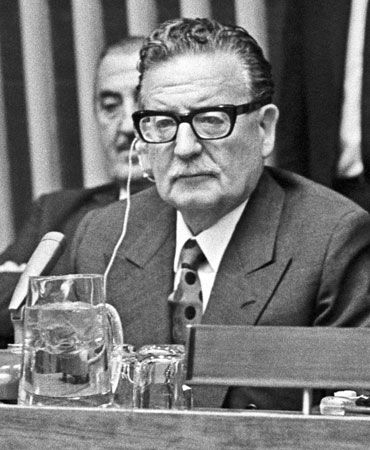Salvador Allende
- In full:
- Salvador Allende Gossens
- Born:
- June 26, 1908, Valparaíso, Chile
- Died:
- September 11, 1973, Santiago (aged 65)
- Title / Office:
- president (1970-1973), Chile
Salvador Allende (born June 26, 1908, Valparaíso, Chile—died September 11, 1973, Santiago) was Chile’s first socialist president.
Allende, born into an upper-middle-class family, received his medical degree in 1932 from the University of Chile, where he was a Marxist activist. He participated in the founding (1933) of Chile’s Socialist Party. After election to the Chamber of Deputies in 1937, he served (1939–42) as minister of health in the liberal leftist coalition of President Pedro Aguirre Cerda. Allende won the first of his four elections to the Senate in 1945.
Allende ran for the presidency for the first time in 1952 but was temporarily expelled from the Socialist Party for accepting the support of the outlawed Communists; he placed last in a four-man race. He ran again in 1958—with Socialist backing, as well as the support of the then-legal Communists—and was a close second to the Conservative-Liberal candidate, Jorge Alessandri. Again with the same support he was decisively defeated (1964) by the Christian Democrat Eduardo Frei. For his successful 1970 campaign Allende ran as the candidate of Popular Unity, a bloc of Socialists, Communists, Radicals, and some dissident Christian Democrats, leading in a three-sided race with 36.3 percent of the vote. Because he lacked a popular majority, however, his election had to be confirmed by Congress, in which there was strong opposition from the right. Nevertheless, it was confirmed on October 24, 1970, after he had guaranteed support to 10 libertarian constitutional amendments demanded by the Christian Democrats.
Inaugurated on November 3, 1970, Allende began to restructure Chilean society along socialist lines while retaining the democratic form of government and respecting civil liberties and the due process of law. He expropriated the U.S.-owned copper companies in Chile without compensation, an act which set him seriously at odds with the U.S. government and weakened foreign investors’ confidence in his government. His government also took steps to purchase several important privately owned mining and manufacturing sectors and to take over large agricultural estates for use by peasant cooperatives. In an attempt to redistribute incomes, he authorized large wage increases and froze prices. Allende also printed large amounts of unsupported currency to erase the fiscal deficit created by the government’s purchase of basic industries. By 1972 Chile was suffering from stagnant production, decreased exports and private-sector investment, exhausted financial reserves, widespread strikes, rising inflation, food shortages, and domestic unrest. International lines of credit from the United States and western Europe had completely dried up. Allende’s inability to control his own radical left-wing supporters further incurred the hostility of the middle class. In foreign affairs, he established relations with China and Cuba.
Allende retained the support of many workers and peasants; his electoral coalition won 44 percent of the vote in the March 1973 congressional elections. His government, however, was overthrown on September 11, 1973, by a military coup led by Augusto Pinochet. During a concerted attack on the presidential palace, Allende died, and the manner of his death became a subject of controversy. Military officials claimed that he had committed suicide, while others believed that he had been killed and that an apparent suicide had been staged. In 1990 his body was exhumed from an unmarked grave and given a formal public burial in Santiago. As part of a criminal investigation into alleged murders committed by Pinochet’s regime, Allende’s body was again exhumed in May 2011, and a scientific autopsy was performed. The results confirmed that he had committed suicide.













